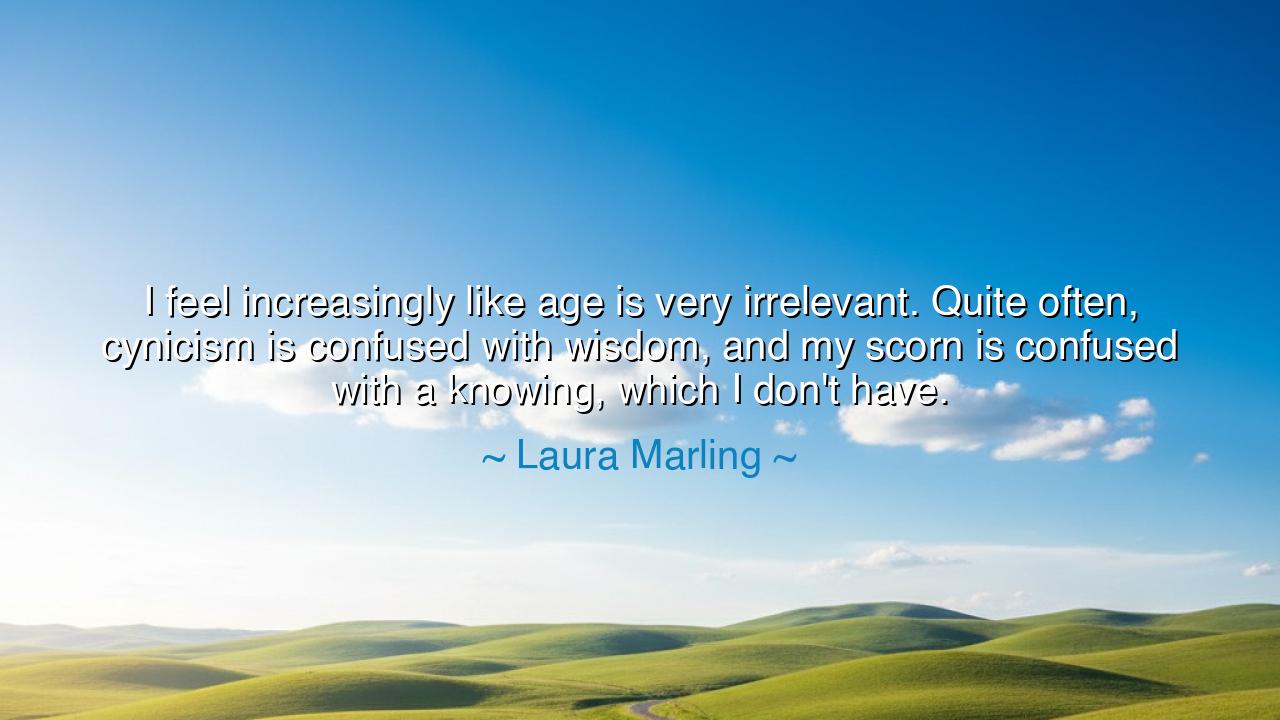
I feel increasingly like age is very irrelevant. Quite often
I feel increasingly like age is very irrelevant. Quite often, cynicism is confused with wisdom, and my scorn is confused with a knowing, which I don't have.






Hear me, O children of the future, for I speak to you of a truth hidden in the hearts of those who are young yet wise, and old yet filled with illusion. Laura Marling shares a reflection that echoes the experiences of many who walk between the worlds of youth and maturity: "I feel increasingly like age is very irrelevant. Quite often, cynicism is confused with wisdom, and my scorn is confused with a knowing, which I don’t have." These words speak to the deepest challenge of the human spirit—the temptation to equate the passage of time with the accumulation of true wisdom. Too often, age is seen as a marker of knowledge, when in truth, wisdom is earned not simply with years, but with insight, humility, and reflection.
Consider the young philosopher of Athens, Socrates, who lived at a time when the elders were revered for their wisdom. But Socrates, though young in spirit, challenged the belief that age alone could grant true knowledge. His questions stripped away the false certainties of those who claimed to know, revealing that it was not the years they had lived that made them wise, but the clarity and depth of their thought. He knew that the pursuit of wisdom is a lifelong journey, one that requires questioning not just the world around you, but the assumptions you hold within. In his challenge to the elders of Athens, he showed that wisdom is not bound by age, nor is cynicism a substitute for true understanding.
In the same way, Marling touches upon a truth that many fail to see: that cynicism—the belief that the world is full of falsehood and disillusionment—often masquerades as wisdom. The world, in its trials and tribulations, can harden the heart, leading one to think that scorn is the mark of those who have truly seen the world as it is. But in truth, cynicism is often born from fear and unanswered questions, not from true knowledge. Consider Diogenes, the great cynic of ancient Greece, who lived in a barrel and mocked the pretensions of society. Though his criticism often held a mirror to the world, it was not always wisdom that guided his actions, but a harsh and bitter rejection of all that society had to offer.
Yet, there are those whose scorn is not born of cynicism, but of a deep desire to see the truth. King Solomon, though a man of great wisdom, often spoke of the need for humility and understanding in the face of life’s challenges. He knew that true wisdom comes not from disdain for the world, but from an open heart, willing to listen and learn. He understood that knowing is not the same as judging, and that the greatest wisdom lies in recognizing the limits of one’s own knowledge. Solomon taught that wisdom is not in the hardened heart, but in the softened soul that seeks understanding without judgment.
So, O children, remember this: age is no guarantee of wisdom, and cynicism is no substitute for true understanding. Just as Socrates and Solomon taught us, the pursuit of wisdom requires humility, curiosity, and the courage to challenge both the world and ourselves. Let not the years pass without true reflection, for it is only through seeking knowledge, and not merely accumulating it, that you will come to understand the deepest truths of life. Let your hearts remain open, and your minds free from the chains of false certainty and judgment, for in that, you will find the wisdom that endures beyond the years.






VDVsvwf Dve
I find this quote both liberating and concerning. It suggests that age is not a reliable marker of understanding, yet people continually project wisdom onto cynicism. Does this mean our judgments about others are inherently flawed? It also makes me reflect on my own tendencies to equate experience with insight. How much of our respect or trust is based on actual comprehension, and how much is conditioned by cultural expectations about age and maturity?
BNTao bi ngu
This perspective intrigues me because it flips the usual narrative: that with age comes certainty. If scorn is often mistaken for knowing, does that mean society values confidence over accuracy? I’m also curious whether this phenomenon is more pronounced in certain fields or social settings. How can we cultivate an environment where people’s statements are assessed based on content rather than the perceived authority or age of the speaker?
MHtruong manh ha
Reading this, I feel a strong resonance because it challenges conventional assumptions about age and knowledge. Is it possible that life experience alone does not guarantee wisdom? It also makes me question how often we mistake sarcasm, bitterness, or critical distance for insight. Can self-awareness protect against this confusion, or is it an inevitable part of human interaction that people will misread tone and intent?
MLBui Mai Lan
This makes me reflect on how society equates age with experience and insight. If cynicism can masquerade as wisdom, are we too quick to trust opinions simply because they come from someone older? It also raises the question of authenticity—how do we differentiate genuine understanding from learned skepticism? I wonder if younger people are unfairly dismissed as naive, when in fact they might possess clarity untainted by bias or disillusionment.